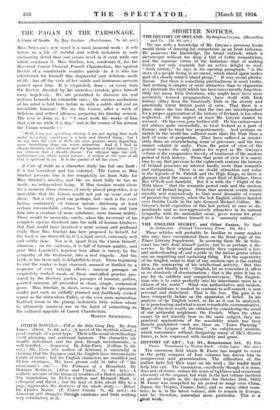THE PAGAN IN THE PARSONAGE.
A Cure of Souls. By May Sinclair. (Hutchinson. 7s. 6d. net.) Miss SiNcLAnes new novel is a most immoral work : it sets before us a life of slothful and selfish hedonism in such enchanting detail that our senses revel in it even while our minds, condemn it. Miss SinClair, too, condemns it, for the Reverend Canon Clement Purcell Chamberlain, the opulent Rector of a comfortable country parish—he it is who has established for himself this disgraceful and delicious mode of life—has all the vials of her subtle and humorous sarcasm poured upon him. It is exquisitely done : at every turn the Rector, directed by his merciless creator, gives himself away hopelessly. We are permitted to discover his real motives beneath his ostensible ones : the sinister mechanism of his mind is laid bare before us with a subtle skill and an irresistible humour. We see the Canon, after a week of delicious and refined idleness, preparing his Sunday sermon. The text is John ix. 4 : " I must work the works of him that sent me while it is day," and in the course of his sermon the Canon remarks :-
"Well, I am not upholding slavery, I am not saying that work under insanitary conditions is a holy and blessed thing ; but I do say that the evils of sloth are even greater, more degrading, more brutalizing than our worst industries. And if I had to choose between utter idleness and the hardest of hard labour, it is not idleness that I should choose. For idleness saps the will, undermines our whole moral nature ; it strikes at the root of all that is spiritual in us. It is the parent of all the vices."
A Cure of Souls as a character study has but one fault :
it is too consistent and too external. The Canon as Miss Sinclair presents him is too completely an Aunt Sally for Miss Sinclair's missiles, and like an Aunt Sally he has no inside, no independent being. If Miss Sinclair would abate for a moment those showers of nicely placed projectiles, it is incredible that the Canon would not put up some sort of show. Not a very good one perhaps, but—such is the ever- lasting contrariety of human nature—disclosing at least
certain irreconcilable virtues to balance his sins and turn him into a creature of more substance, more human reality. There would be moments, surely, when the ice-cream of his
complete egoism dissolved into the milk of human kindness.
But that would have involved a more serious and profound study than Miss Sinclair has here proposed to herself, for the book is (no discredit to it !) a light novel, extremely well and subtly done. Nor is it, apart from the Canon himself, inhuman : on the contrary, it is full of human quality, and poor Miss Lambert's hopeless love affair is raised, by the sympathy of the treatment, into a real tragedy. And the book, as has been said, is delightful to read. From beginning to end the reader is kept charmed, amused or thrilled by a sequence of ever varying effects : luscious passages on exquisitely cooked meals or those unrivalled peaches pro- duced by the Rectory garden, passages of humour, pathos, pointed sarcasm, all presented in clean, simple, economical prose. Miss Sinclair, in short, serves up for the epicurean reader just such an artfully planned and faultlessly cooked repast as the miraculous Fuller, or the even more miraculous Radford (cook to the plump, hedonistic little widow whom he ultimately marries) was in the habit of submitting to the cultured appetite of Canon Chamberlain.
MARTIN ARMSTRONG.














































 Previous page
Previous page